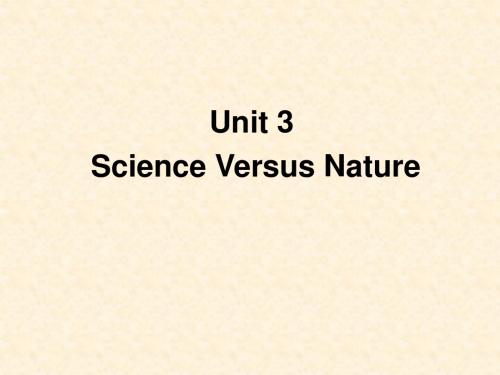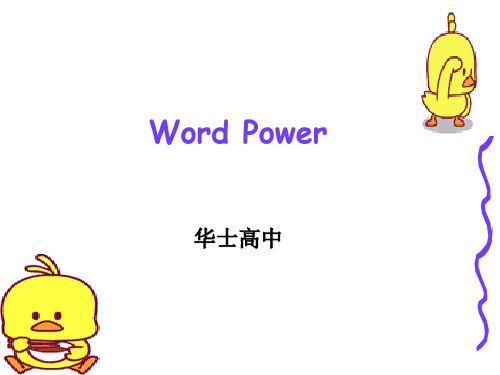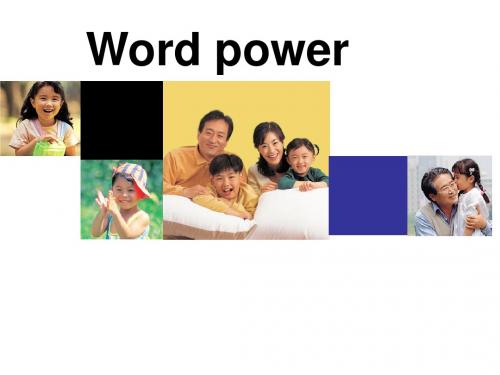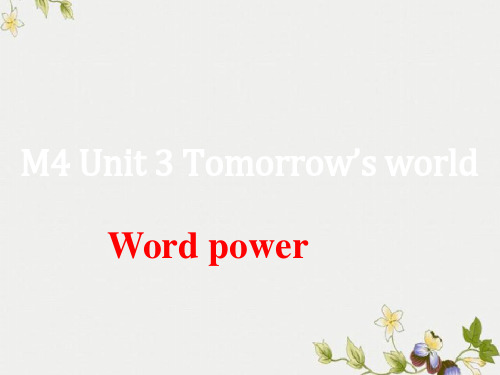m1u3wordpower上课.
- 格式:pdf
- 大小:5.91 MB
- 文档页数:41





Unit 1Period 3 Word powerThe General Idea of This Period:This period is about vocabulary learning, which is so challenging. In this periodyou will learn some techniques to enlarge your vocabulary. Also we will learn toread a map and find the shortest way to a certain place.Teaching Aims:Enable the Ss to be able to read a map.Enlarge Ss’ vocabulary by learning about school facilities.Teaching Important &Difficult PointsHelp the students to find the way and express themselves in English.Some mon techniques to enlarge Ss’ vocabulary.How to express themselves in English when finding the way.Master some techniques to enlarge vocabulary.Teaching Methods:petition to stimulate them to act quickly and actively.Association to increase their interest and enlarge vocabulary.Teaching Aid:A multimedia.Teaching Procedures:Step 1 Greetings1. Greet the whole class as usual.2. Check their homeworkStep 2 Lead inT:When we go to a place for the first time,a map is very helpful. It canhelp us to get familiar with the place soon and find our destinations quickly.T:S1 ,do you often take a map when you go to somewhere?S1 :No,I don't think I need it.T:That may be because you don't go to a strange place often.S1:Yes. And also I think I have a good sense of directions.T:Good! Now I will show you a map.(Show the map on Page 6 on the screen. )T : Look at the map carefully please. See where Wei Hua is and where shewants to go.T : S2.. Would you please tell us the way she takes?S2 :She is at the school gate,walks towards the car park and goes betweenthe car park and the art room. She then turns left,walks past the science laboratory and goes straight on...T: Very good! But you see there is another route here on the map. Who'dlike to explain it?S3 :She walks past the lecture hall and turns left. She has a stop at theoffice building. After she leaves the office building,she walks betweenthe gym and the garden. Then she sees the destination : the canteennext to the swimming pool.T:Wonderful! You both did a good job and I can't wait to give you a petition:Please tell us where you are standing and where you want to go. Thenyou pick anyone from the next group to tell us the way and Let's seewhich group will do it best.(The teacher may write down Group 1 ,Group 2,Group 3 and Group 4on the Bb. When they are peting, you may draw stars if they havedone a good job. After one or two rounds, the teacher may presentanother game)Now let's play Hide-and-Seek:Each of you please write a route: where are you at first, and then yougo,and go and then.., and at last ask anyone from the next group tojudge where you are at last. OK?(This is a succession of the previous game and at the end let thestudents see how many stars each group has got. )Step 3 Notice pletionT:Just now Wei Hua went to the office building,and she had a noticefrom the Students' Office, but some of the names of the buildings aremissing. Please fill in the blanks so she can find her way around theschool.You may discuss with your partner of the words.(After several minutes, the teacher may ask the whole class to checkthe answers in chorus, for this part is not too difficult. )Step 4 Part D: GymT:Opposite the canteen is a gym. It is a place where you students like togo,so do the students at CMHS. First can you tell me why you like togo there?What can you find there?(Ask the students to name as many names as possible about the piecesof equipment. )Let's have a look at the inside of the gym. There are a lot of pieces ofequipment in the gym. Below are eight of them. Write the number ofeach piece in the correct box.(This is easy for them,so after checking the answers,the teacher maystimulate them to list related vocabulary. )basket backboard reboundbasket support basketballringNBA/CBAT:You can also think of words of a same group. What other kinds of ballgames can you think of besides basketball?football volleyball golfbasketballtable tennissoccerT:Another way is to find words of similar meanings.possibleshouldT: Derivation is another way to enlarge your vocabulary.pete--petition--petitor--petitiveT: Also there are many suffixes and prefixes:(Ask students to give examples of prefixes and suffixes and explain their meanings. )Step 5 SummaryT: Today we have covered word power. In this class we learned to express ourselves in finding ways. After class do Part B in word power by your selves and tomorrow we'll check it. Then we learned some basic strategies to enlarge our vocabulary, and I do hope you often use them in future. Find out more strategies after class.Step 6 Homework1. Finish part D3.Discuss the following questions in groups:Do you think having a gym is an important factor for students when choosing a school?Why are more and more key schools spending a large amount of money on improving their school facilities?Do you think it is necessary for all schools to have this kind of equipment?。

Unit 3 The world onlineWord powerTeaching aims:After learning this period, the students will be able to:1.enlarge their vocabulary relat ed to the Internet;2. arouse their interest in learning more about the Internet.Teaching procedures:Step 1 lead-in1. Lead in by reviewing the words about computers, which have been learned in Module 4, Unit 3. Show the pictur e about a computer; get students to give the names of the different parts. (PPT4-5)2. Brainstorming. The Internet plays a very important role in our daily lives. To surf the Internet, we need to be familiar with some words and terms. How many words do you know related to the Internet?Ask students to give as many words as they can. (PPT6)Step 2 Vocabulary learning1.Ask students to read Part A. Make sure that students know what these words in blue mean or refer to in Chinese.2.Get students to fill in the blanks with their books closed to see whether they have remember all the words listed in Part A. (PPT7-10)1) When you _________ for something, you are looking for specific information.2) You can click the button of _____________ to return to the previous page.3) When you’re looking at information without a specific goal, you’re__________.4) When you find something on the Internet that you want to save, you can__________ it onto your computer.5) When you want to bring a page to full size, click the ___________ icon.6) If you have something you want to publish on the Internet, you can __________ it from your computer.7) When you finish viewing a page, you can click the ______ icon at the top right hand corner to exit the page.8) When the web page has a problem, you can click on the __________ button and the page may appear again without a problem.9) If you want to stop viewing a page, but you might want to come back to it later, click the ________ icon and the name of the page will stay at the bottom of your screen.Answers:1)search 2)back arrow 3)browsing 4)download 5)maximize6)upload 7)close 8)refresh 9)minimize3. Ask students to focus on Part B on Page 38 and encourage them to read the sentences individually first. Make sure that students these words mean or refer to in Chinese. (ppt11-12)Step 3 Vocabulary usingAllow students three or four minutes to deal with Part C on Page 39 to consolidate the use of the vocabulary learnt in Parts A and B. As there are some new words in the letter, encourage students to guess the meanings from the context. Then check the answers as a class. (PPT13-14)Step 4 Vocabulary extension1. Ask students whether they have ever used some abbreviations that people often use in Internet chat room. Get students to guess the meaning of some abbreviations. (PPT 15-16)B4: __________________OIC: _________________CUL8R: _______________BTW: _________________BFN: __________________Answers:before; Oh, I see; See you later; by the way; bye for now.2. Allow students three minutes to complete Part D on Page 39. Get them to write the correct abbreviation in the blanks. Then check the answers together. (PPT17-19)Step 5 Homework1. Memorize the words in word power.2. Surf the Internet and find more words related to the Internet.。
M1U3 Word power教材分析Word power in this unit focuses on types of sports with relevant exercises designed to expand students’ vocabulary related to sports. The text intends to help the students get familiar with or even master the names of various sports by means of reading, and blank filling. The students who are expected to learn this part are all teenagers around 17 or 18 years old. There is no doubt that they really have great interest in sports and some of them even do very well in sports. In this sense, the topic of sports in the Word power must be appealing to them, which may arouse their interest in learning the names of all kinds of sports, especially for those boys who don’t like to remember English words.三维目标1.To enlarge the vocabulary of different types of sports2. To discuss what we can benefit from sports重点难点1. Help the students talk about sports and learn some new words.2. Help the students remember some new names of sports.教学方法1. Discussion in pairs or in groups.2. Task-based in-class activities.教具准备A tape recorder and a multimedia room.教学过程Step 1 Lead-inEveryone wants to be healthy and attractive. Everyone wants to feel and look good. In the last several classes, we have read about a Canadian actress who had to go to hospital because she took some weight-loss pills. We know that taking exercises is good for our bodies. And now many people are taking up many different kinds of sports. And now there are many kinds of matches held in the world now and then.Step 2 BrainstormingFree talk1. How many kinds of sports can you name?2.Among all kinds of sports, which do you like best?Step 3 Vocabulary learningStep 4 Vocabulary extensionSports are quite popular all over the world. Different people have different interests and tastes. Some sports are done indoors, while others are done outdoors. (Part D)her strong again. (Part C)Step 5 Activity: to guess the names of the sportsLet the students guess the names of some sports. The teacher can show the pictures of sports on the blackboard and then ask one student to describe the details of sport and after the explanation, ask another to name the sport. The teacher can ask the student to go to the front of the class and stand with his or her back facing the picture on the blackboard. Before the game starts, the teacher can give some clues and make it clear to the students that the one who is going to describe the sports can say something like: how many team members there are in the sport; how the sport is played; what its rules are; what instructions a new player has to pay attention to; whether there are some famous Chinese players who are good at the sport. (If possible, the teacher can present these questions on the blackboard, which can help the students to describe the sport. ) When the student guesses the name of the sports, the teacher can give them a present. Usually, it is the boys who are greatly interested in sports and it has been proved that boys take part in the game more actively and successfully.Sometimes the students may have some difficulty in describing the sports. If so, the teacher can give them some help. Students may also find it hard to figure out the names of the sports. In that case, the teacher should give them more opportunities to have a try.Step 6 DiscussionI. Let’s share:Among all the sports, which one do you like best and why?(4 in group)II. Let’s do proper sports.Suppose one of your friends doesn’t like sports and usually kills his or her time by reading or watching TV. Do you think you can persuade him or her to give up this bad habit?What kinds of advice or suggestions will you give to him or her?I want to get strong and have some fun with my friends!I want to have some fun and exercise with only one of my friends!I want to build up my strength by myself!We just want to lose weight!III. Let’s discuss:What can we get from SPORTS? List as many reasons as possibleStep 7 Homework1. Try to find out more words about sports.2. Talk about your favorite sports with your partner.。